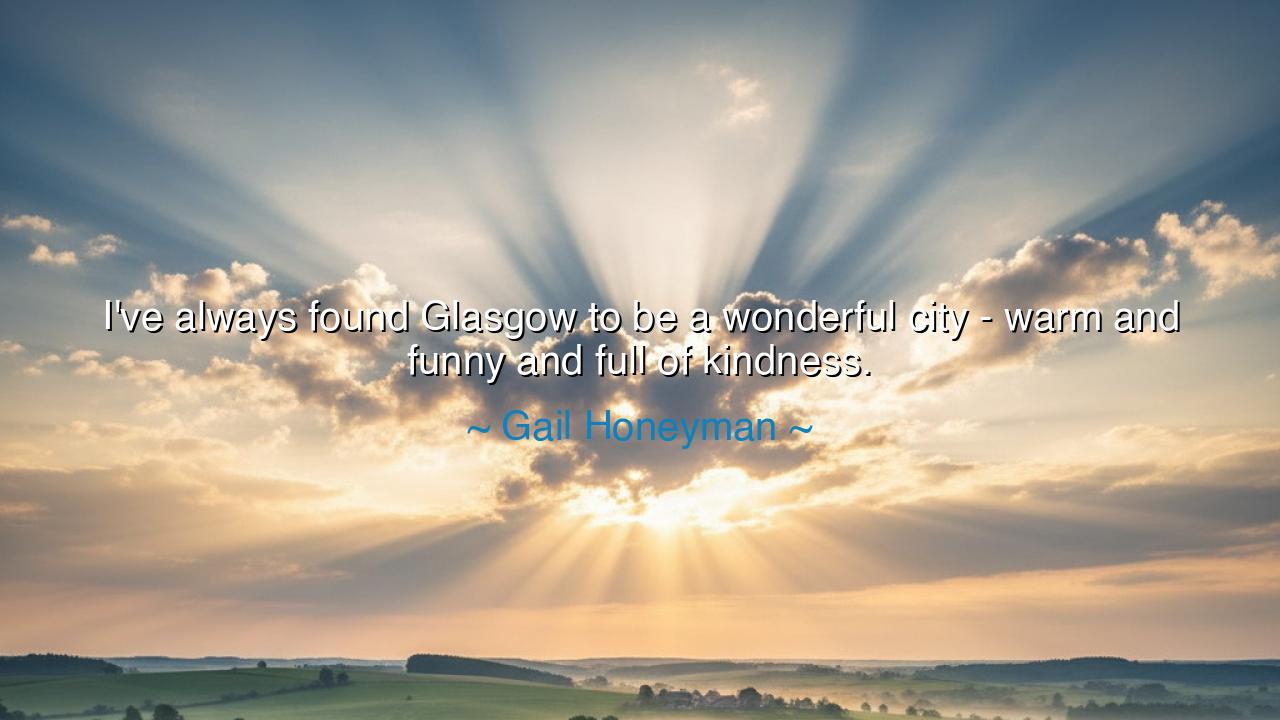
I've always found Glasgow to be a wonderful city - warm and funny
I've always found Glasgow to be a wonderful city - warm and funny and full of kindness.






The novelist Gail Honeyman, whose tender storytelling reveals both the pain and resilience of the human heart, once said: “I’ve always found Glasgow to be a wonderful city — warm and funny and full of kindness.” At first glance, her words may seem a simple tribute to a place she loves. Yet beneath their simplicity lies a deeper truth — a meditation on community, human connection, and the quiet strength that flows through ordinary lives. In praising the spirit of Glasgow, Honeyman is not merely speaking of stone and street, but of people — of the sacred warmth that arises when hearts choose generosity over indifference.
To call a city “warm” is not to describe its weather, but its soul. Honeyman’s Glasgow is not the gray, rain-swept metropolis outsiders imagine, but a city of laughter, where strangers nod in greeting and humor binds the weary together. She speaks of a place where kindness has become a kind of wisdom — where hardship, rather than hardening the spirit, has softened it. This is the paradox of true strength: those who have suffered often learn compassion more deeply than those who have never known struggle. The warmth she describes is not comfort without pain; it is humanity forged in the fire of resilience.
Throughout history, cities have carried souls of their own. The ancient Athenians built temples to wisdom, and their laughter filled the marketplaces of philosophy. The Romans celebrated order and might, while the Venetians cherished art and beauty upon their waters. But Glasgow, like the cities of the common folk — Liverpool, Dublin, Naples — carries a different kind of greatness: the greatness of the heart. Born from industry, hardship, and labor, its people have learned to find humor in difficulty, dignity in toil, and solidarity in survival. This is the kindness Honeyman speaks of — the compassion that blooms not from luxury, but from shared endurance.
Consider the story of Charles Rennie Mackintosh, the great architect of Glasgow, who built not palaces for kings but schools and homes for the working people. His art was clean, bright, filled with light — a reflection of the Glaswegian soul itself. When his designs were misunderstood in his lifetime, he did not turn bitter; he simply kept creating. His legacy, like the city he loved, reminds us that even when the world fails to recognize our worth, we may still live beautifully, kindly, and with purpose. Mackintosh’s spirit — unyielding yet gentle — is the same spirit that Honeyman finds in Glasgow’s people: funny, hopeful, and endlessly human.
When Honeyman speaks of humor, she reveals another layer of wisdom. For laughter, in such a place, is not mere amusement; it is armor. It is how the heart defends itself against despair. The people of Glasgow, she suggests, have learned that to laugh — even through hardship — is an act of courage. It is how one refuses to be defeated by sorrow. In the same way that her character, Eleanor Oliphant, discovers that healing comes not from isolation but from connection, so too does the city itself teach that joy and compassion are the twin lights that guide humanity through the grayest days.
There is something deeply spiritual in this view of the city — not in the sense of religion, but in the sense of shared grace. Kindness, as Honeyman describes it, is not a grand gesture but a daily choice. It lives in small acts: a door held open, a joke shared on a rainy morning, a neighbor’s quiet concern. It is the humility of people who know that life is hard for everyone, and that the only remedy is to be gentle with one another. This kind of goodness is not taught by institutions; it is passed down through the living fabric of a city, generation by generation, like an old song sung anew.
The lesson, then, is this: true greatness is not found in monuments or wealth, but in warmth. To build a city — or a life — that is “full of kindness” is to build something eternal. We must learn to see as Honeyman sees: to look beyond appearances, to value humor in sorrow, and to cherish compassion as the highest form of wisdom. Every community, every heart, can become like her Glasgow — radiant not because it is perfect, but because it chooses, again and again, to be human.
So, my child, remember her words when you walk through your own city, or when you meet a stranger on a crowded street. Be the warmth that someone remembers, the laughter that breaks the storm, the kindness that endures when all else fades. For as Gail Honeyman reminds us, the true soul of any place — and of any person — is measured not by brilliance or beauty, but by the quiet strength to remain warm, funny, and full of kindness in a world that often forgets how.






AAdministratorAdministrator
Welcome, honored guests. Please leave a comment, we will respond soon